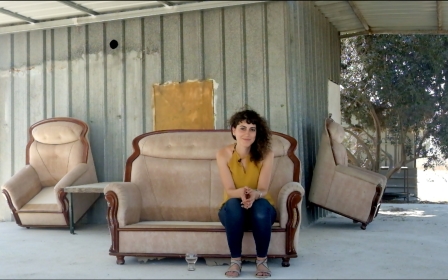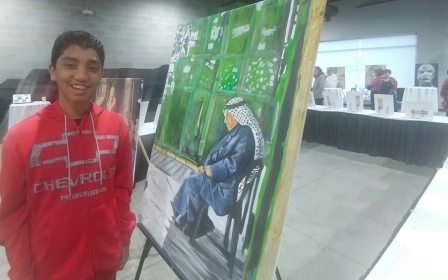7 Days in Entebbe: More propaganda than art

If art is meant to imitate life, then poor art is an exercise in futility.
This is precisely how I felt when I walked out of José Padilha's 7 Days in Entebbe, Hollywood's latest instalment dealing with the Palestinian hijacking of Air France Flight 139 in 1976. Padilha's offering is disappointing, flawed and frankly offensive.
And not for the reasons you may be expecting.
The German connection
Despite its billing as the most accurate portrayal of Israel's famous rescue operation, one that has had far-reaching implications for Israeli responses to Palestinian resistance, the film is a hodgepodge of historical account and fictional dramatisation that left me fuming.
Two German leftists (Wilfried Böse and Brigitte Kuhlmann) pair up with the Popular Front for the Liberation of Palestine to hijack an Air France aircraft plane with 248 passengers on board during a stop in Athens.
The plane is directed by its hijackers to the airport in Entebbe, in the hope their cause will be supported by then Ugandan leader and dictator Idi Amin.
The hijacking of a plane with around 105 Israeli passengers was meant to force Israel's hand in negotiating for the release of jailed Palestinians. Israel, known for its vehement opposition to negotiations with "terrorists" (also known as the occupied Palestinians), surprise the hijackers by agreeing to talk, but secretly launch a mission to rescue the hostages in what became known as one of the boldest Israeli operations.
A film that positions itself as sympathetic to Palestinian resistance cannot help but frame the Israelis as willing to debate, argue and ask tough questions of themselves before choosing violence as a necessary response
No surprises here: the Israelis heroically enter the airport, kill the bad guys and get the hostages home. Before the film was released, it was touted as a bold take on the events in Entebbe.
Not only would the film challenge the narrative that Yonathan Netanyahu (current Israeli PM Benjamin's elder brother) was a hero during the raid (his mistakes during the raid nearly cost the Israelis dearly), it would also tell the story through the eyes of the two German accomplices that history has mostly forgotten.
The German connection is precisely why I was interested in the film in the first place.
Primary questions
But between peculiar, if not bizarre, dance sequences and heated exchanges at the Israeli cabinet level on "an appropriate course of action", the film struggles with some of the primary questions underpinning the plot.
Why the members of the German left (they were members of the Revolutionary Cells) chose to join Palestinians in hijacking a plane full of Israelis given that country's stupendous guilt over the events of the Holocaust is never explained.
So instead of the film using the opportunity to explain how the urgency of the Palestinian cause attracted a broader base of anti-colonial and anti-racist activists to take such a political risk, it instead paints the two Germans as faux revolutionaries suffering an identity crisis.
Nevermind the occupation, the continuous incursion into Palestinian land and resources, it is the Israelis who are interested in peace
As the film reaches the climax, and Jewish passengers are seen being separated from the rest, the two Germans appear to undergo a change of heart. They feel betrayed by the Palestinians and out of place; they regret their earlier determination to be part of the operation.
According to historian Saul David's book Operation Thunderbolt upon whose work the film was loosely based, the hijackers did not separate Jews from the rest of the passengers as the film suggests (instead the hijackers separated those holding Israeli passports from the rest).
Neither is there any record of the Germans having an about turn. For the film to confuse anti-Zionism with anti-Semitism and fictionalise their "regret" for partnering with Palestinians is not innocuous.
Violence as necessary response
In looking to redeem the Germans, who are thinkers and intellectuals, driven by ideas of social justice and equality, Padilha finds them guilty of little more than misguided intent. The Palestinian cause, by implication, is summarily reduced to a European existential crisis.
They should have never become involved is the message. The Palestinians, on the other hand, are inconsolable, desperate, and driven only by revenge. They are killmongers. Meanwhile, the Israeli government is the one with the moral "conscience", the capacity to think rationally and strategically as they debate the appropriate measures to respond to the hostage crisis.
They are seen as wanting to end the "fight" with "their neighbours", but driven to take harsh measures as a result of the Palestinians "inability to live in peace".
So here, even a film that positions itself as sympathetic to Palestinian resistance cannot help but frame the Israelis as willing to debate, argue and ask tough questions of themselves before choosing violence as a necessary response.
The militancy of the then defence minister Shimon Peres is balanced by the more peaceful aspirations of prime minister Yitzhak Rabin. In contrast, the Palestinians barely have names, let alone a proper story to tell.
Nevermind the occupation, the continuous incursion into Palestinian land and resources, it is the Israelis who are interested in peace.
But does this not mean that 7 days in Entebbe is anything like the bloodthirsty propaganda flicks of the late 70s and 80s. The Palestinians depicted then may as well have been wild beasts from outer space. Zionism is a lot more sophisticated these days.
And it is precisely this fact that 7 Days in Entebbe positions itself as a "bold" and "different" take on events in Entebbe that makes it ever more dishonest and dangerous.
- Azad Essa is a journalist at Al Jazeera based in New York City. He is also author of The Moslems are Coming (Harper Collins India) He is on Twitter: @AzadEssa.
The views expressed in this article belong to the author and do not necessarily reflect the editorial policy of Middle East Eye.
Photo: '7 Days in Entebbe' positions itself as a "bold" and "different" take on events in Entebbe (www.imdb.com)
New MEE newsletter: Jerusalem Dispatch
Sign up to get the latest insights and analysis on Israel-Palestine, alongside Turkey Unpacked and other MEE newsletters
Middle East Eye delivers independent and unrivalled coverage and analysis of the Middle East, North Africa and beyond. To learn more about republishing this content and the associated fees, please fill out this form. More about MEE can be found here.





